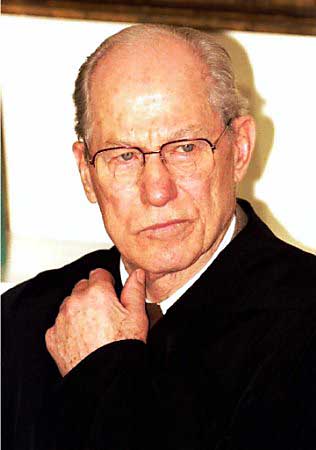Former Supreme Court Justice Byron White Dies
Reuters, April 15, 2002
By James Vicini
WASHINGTON—Byron White, a football star and then a
conservative U.S. Supreme Court justice who retired in 1993 after 31 years on
the bench, died on Monday from complications from pneumonia. He was 84.
White, who was appointed to the nation’s highest court by President John
Kennedy in 1962, died in his hometown of Denver. He had been the only former
living Supreme Court member.
White combined physical prowess as a nationally acclaimed football star in
the 1930s when he was nicknamed "Whizzer" with brilliance that made
him a Rhodes scholar and, in time, a leading jurist.
White "had excelled in everything he had attempted," Kennedy said
admiringly when he appointed his long-time friend and the deputy attorney
general as the 98th Supreme Court justice in U.S. history.
"Justice White was a distinguished jurist who served his country with
honor and dedication. He will be missed," President Bush said in a
written statement on White’s death.
White announced his retirement on March 19, 1993, in a typically brief
statement. He said it had been "an interesting and exciting
experience" and that "someone else should be permitted to have a
like experience."
His retirement cleared the way for President Bill Clinton in 1993 to name
Judge Ruth Bader Ginsburg to the court, marking the first Democratic
appointment in 26 years.
On the court, White displayed an analytical and pragmatic bent that was the
hallmark of the Kennedy administration.
Over his career, he voted with conservative justices on most issues during
the 1960s, 1970s, 1980s and early 1990s.
White Opposed Abortion Ruling
For instance, he dissented from the historic 1973 ruling that declared that
women have a constitutional right to an abortion. He repeatedly urged that the
decision be overturned.
In 1986, he stirred a storm of controversy by
writing the court’s opinion that constitutional protections of privacy do
not extend to homosexual conduct. That dealt a major setback to the "gay
rights" movement and upheld laws in about half of the states that make
sodomy among consenting adults a crime.
The blunt-spoken White said the claims that the
Constitution confers a fundamental right upon homosexuals to engage in sodomy
were "at best facetious."
White consistently opposed restrictions on the police, dissenting from the
famous 1966 ruling that requires officers to tell criminal suspects that they
have the right to remain silent or to have a lawyer present during
questioning.
He also dissented from rulings that outlawed voluntary prayer for children
in the public schools. He said the court should reconsider its rulings that
erected a wall of separation between church and state.
By the late 1980s, White had joined the conservatives in voting against
"affirmative action" programs designed to help minorities and women.
Critics like White said they amounted to a form of reverse discrimination
against whites and men.
After his retirement from the Supreme Court, he occasionally sat as an
appellate judge on the federal Courts of Appeals.
All nine current Supreme Court members issued statements remembering and
paying tribute to White. Chief Justice William Rehnquist said those who served
with White will miss him.
Justice Antonin Scalia recalled, "Anyone who ever met Byron White will
recall his painfully firm handshake: you had to squeeze back hard or he would
hurt you."
"If there is one adjective that never could, never would, be applied
to Byron White, it is wishy-washy. You always knew where he stood,"
Scalia said.
Born June 8, 1917, in Fort Collins, Colorado, he grew up in the small
sugar-beet farming town of Wellington where his father managed a lumber yard
and was the mayor.
Nicknamed ‘Whizzer’ White in College
At the University of Colorado, White excelled in football, baseball and
basketball. A local sports writer dubbed him "The Whizzer," a
nickname he detested, but one that stuck.
In 1937, White was named a football All-American, leading the nation in
scoring and rushing yards on an unbeaten team.
He used his professional signing bonus—at the time a record amount—to
finance his schooling at Yale University’s law school, where he graduated
first in his class.
White played running back for the Pittsburgh Steelers and the Detroit
Lions.
Kennedy met him in England in 1939 when White was a Rhodes scholar at
Oxford and the future U.S. president was visiting his father, then U.S.
ambassador to Britain.
White later served as a U.S. Navy intelligence officer in the South Pacific
during World War II, and wrote the official report on the sinking of Kennedy’s
patrol boat, PT-109.
White, then a successful lawyer in Denver, worked in Kennedy’s 1960
presidential campaign. He was rewarded with the job of deputy attorney
general, the number two Justice Department official under Kennedy’s brother
Robert.
White is survived by his wife, Marion; a son, Charles Byron White; and a
daughter, Nancy White Lippe. The Supreme Court said plans regarding his
funeral were not yet available.
 |
Byron White, a member of
the U.S. Supreme Court's conservative wing who retired in 1993 after 31
years on the bench, died April 15, 2002 from complications from
pneumonia. He was 84. White, seen in this March 1993 file photo, gained
fame first as a football hero and then as a legal scholar who was
appointed to the nation's highest court by President John Kennedy in
1962.
(Ira Schwarz/Reuters)
|
[Home] [News] [USA]
